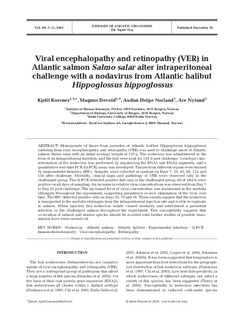Viral encephalopathy and retinopathy (VER) in Atlantic salmon Salmo salar after intraperitoneal challenge with a nodavirus from Atlantic halibut Hippoglossus hippoglossus
Journal article, Peer reviewed
Permanent lenke
http://hdl.handle.net/11250/295830Utgivelsesdato
2005Metadata
Vis full innførselSamlinger
Originalversjon
Korsnes, K., Devold, M., Nerland, A.H. & Nylund, A. (2005). Viral encephalopathy and retinopathy (VER) in Atlantic salmon Salmo salar after intraperitoneal challenge with a nodavirus from Atlantic halibut Hippoglossus hippoglossus. Diseases of Aquatic Organisms, 68(1), 7-15. doi: 10.3354/dao068007Sammendrag
Homogenate of tissue from juveniles of Atlantic halibut Hippoglossus hippoglossus suffering from viral encephalopathy and retinopathy (VER) was used to challenge smolt of Atlantic salmon Salmo salar with an initial average weight of 110 g. The nodavirus was administered in the form of an intraperitoneal injection, and the fish were kept for 134 days post challenge. Genotype characterisation of the nodavirus was performed by sequencing the RNA1 and RNA2 segments, and a quantitative real-time PCR (Q-PCR) assay was developed. Tissues from different organs were stained by immunohistochemistry (IHC). Samples were collected at random on days 7, 25, 45, 69, 125 and 134 after challenge. Mortality, clinical signs and pathology of VER were observed only in the challenged group. The Q-PCR detected positive fish only in the challenged group, all of which were positive on all days of sampling. An increase in relative virus concentrations was observed from day 7 to day 25 post challenge. The increased level of virus concentration was maintained in the medulla oblongata throughout the experiment, suggesting persistence or slow elimination of the virus over time. The IHC detected positive cells on three different sampling days; 34, 70 and 74. These results suggest that the nodavirus is transported to the medulla oblongata from the intraperitoneal injection site and is able to replicate in salmon. When injected, this nodavirus isolate caused mortality and established a persistent infection in the challenged salmon throughout the experiment. This susceptibility suggests that co-location of salmon and marine species should be avoided until further studies of possible transmission have been carried out.

